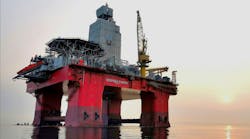By an OGJ Online Correspondent
PARIS, Feb. 6 -- Development of deep and very deep oil in waters beyond the 200-mile economic zone will raise some difficult geopolitical questions, the Institut Français du Pétrole (IFP) has been told.
Jean-François Giannesini, advisor to the IFP president, discussed the issues in a paper for IFP's Panorama, a review of the previous year's energy events.
He said deep and very deep sea hydrocarbon exploration is targeting the "great abyssal plains, beyond the foot of the continental shelf, towards 1,500 m depths." Deep sea proven resources currently are only about 3-4% of world reserves.
Giannesini said development of deep sea hydrocarbons will influence geopolitics by changing the distribution of world strategic resources, by the technological impact, and by the economic activity generated.
He said deep sea investments require considerable investments of $10-12/bbl, making financial returns smaller. But he said they will require cutting edge technology that "can create wealth of a different nature, expressed in terms of competence and know-how." He argued this type of wealth is distinctly longer-lasting than purely monetary wealth. He said a good example is Brazil, where the need to produce deep sea reserves has created a specific industry, world leader in its area, but has also helped develop universities and technology research centers.
He said that economically speaking, deep sea developments would be marginal production. He saw three scenarios. One is little development due to high costs, cheaper alternative sources of oil, or declining oil demand. A second is development of deep sea reserves without disruption of the current market. And the third is the successful development of large reserves through technological progress or the discovery of many giant fields. He said a mix of scenarios two and three is most likely.
Most of the deep and very deep sea basins extend beyond the exclusive economic area of 200 nautical miles and are within the international zone that the 1982 United Nations convention on the law of the sea allowed to the "common human heritage."
The UN is responsible for organizing, controlling, and redistributing the profits resulting from such exploitation. Giannesini said that raises two "essentially geopolitical questions." How will the UN dispose of the production, and how will the money be used?
